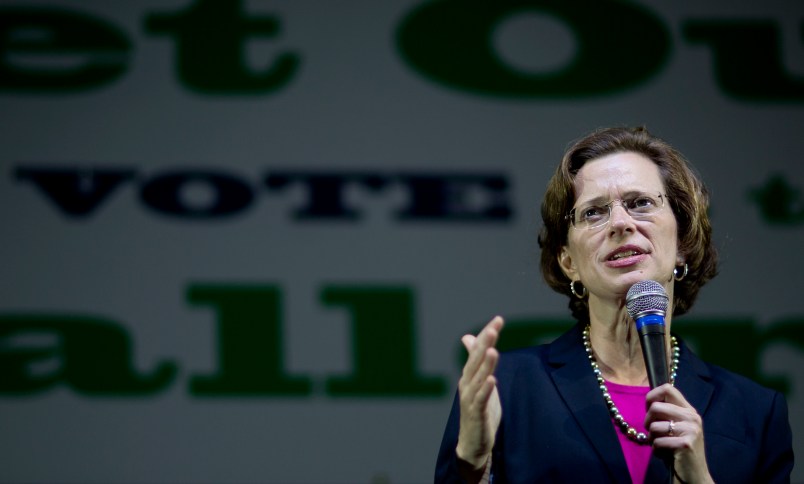The biggest prize in the 2014 midterms is control of the U.S. Senate. Georgia’s race between Democrat Michelle Nunn and Republican David Perdue is now at the very heart of that national fight. The candidates are essentially tied in the polls with less than a week to go.
While Perdue has run a conventional “red state” race, rhetorically pitting himself against the president and national Democratic leadership, Nunn’s campaign has charted a course that seeks to expand the voter pool and to find ways to peel away votes from the Republican base. In the closing days, Nunn seems to have found momentum on the strength of two issues: Perdue’s “outsourcing” vulnerability and her own, strong positions on national security.
The more interesting of these issues from a policy perspective is national security. Polling data from the Georgia electorate actually showed that there is very little partisan divide in the public’s approach to national security. In a hyper-partisan environment, Nunn is playing the one note that rings true across the political spectrum.
Polling by the Hicks Evaluation Group during this election cycle found that Republicans and Democrats in Georgia tend to agree on the imperatives of national security. They do not believe in a unilateral, “go it alone” foreign policy but rather favor a multilateral approach to U.S. engagement in world affairs. Nunn has perfected a message that prioritizes both American military strength and the wise use of soft power to make a better, safer world. That message seems to be reaching Georgia voters.
Nunn is a credible voice for a muscular America in a post-9/11 world. She believes in building coalitions to advance our interests abroad by preserving global order. She has spoken passionately for restoring funding cuts to the U.S. military, and of her commitment to protect Georgia’s position as a critical player in U.S. military readiness. Military installations employ more than 140,000 Georgians and are a key economic driver for the state. Nunn aims to be placed on the Senate Armed Services Committee, the same seat of authority which her father used during his long career to substantially benefit Georgia.
Georgians deeply respect former U.S. Senator Sam Nunn for his statesmanship on issues of foreign and military affairs. He remains a global figure working for nuclear non-proliferation. The elder Nunn was a moderate Democrat who regularly reached across the aisle and led on issues of national security. Michelle Nunn’s closing strategy is to embrace her father’s legacy. It is a strategy that seems to be working in Georgia, and that could likely work for Democrats in other Republican-leaning parts of the country moving forward.
Where Perdue has voiced little coherent strategy about how he would use his position in the Senate except as a roadblock to the president’s priorities, Nunn has crafted an appeal to voters that signals she’s going to be a bulwark against the threats of a dangerous world. She has a better answer than her Republican opponent to voter fears about the chaos of the Middle East, domestic and cyberterrorism and public health threats like ebola. This could explain why her polling numbers are getting stronger.
More important than the politics of the race is the simple, practical truth. Georgians are right to prefer to elect a Senator who has both vision and fortitude. Nunn’s strengths are real, and they are appealing. Many Georgians are recognizing that she would be a highly effective Senator.
Security isn’t a red issue or a blue issue. Nunn’s success in making this contest too close to call is a very strong indicator that she’s found a key to breaking through the partisan divide. Democrats who are credible and strong on national security can compete for every vote, even in “red” America. Look for more Democrats to follow Nunn’s example.
Amanda Mattingly is a former Foreign Affairs Officer at the US Department of State. Jeff Schoenberg is a former Senior staffer to a U.S. Senator. They are both Truman National Security Fellows in Atlanta, GA.






